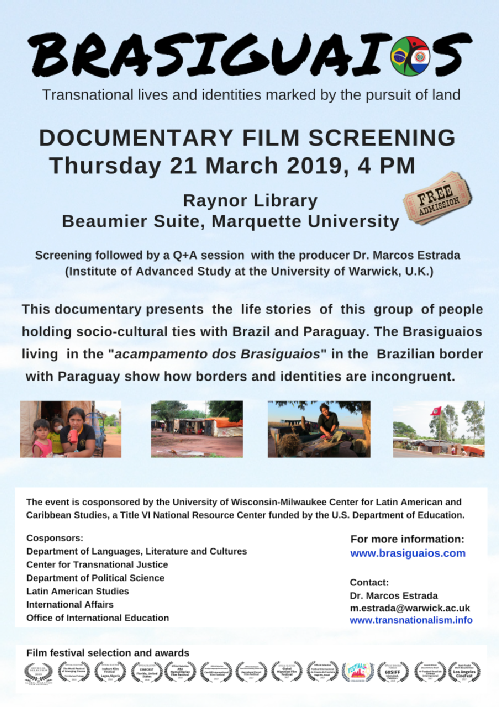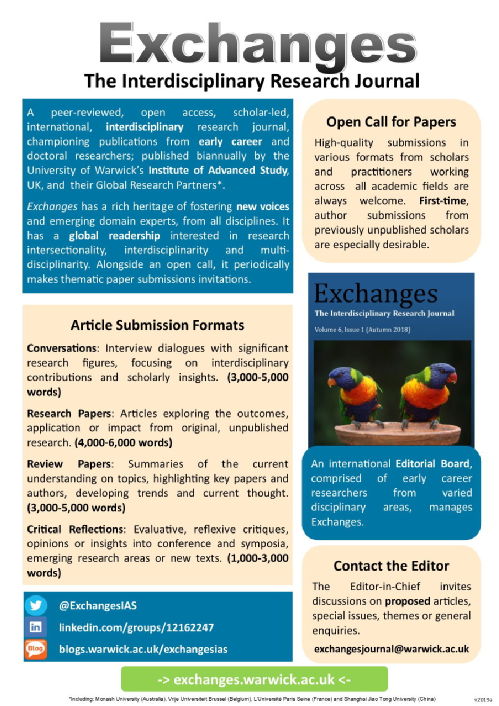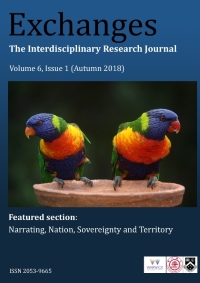In my last post I talked about interviews, or the Conversations with, series of articles that we publish in Exchanges. In today’s post, I’m going to talk about the other kind of article which stands alongside the more research intensive pieces in the journal: critical reflections. According to our author guide a critical reflection article comprises:
Focussed, critical appraisals typically covering an area of emerging research, a key event or a crucial new text. (1,000-3,000 words).
That’s not a long explanation for what are actually highly readable and insightful articles, so let me expand a little here. When people approach us with a critical appraisal article, most commonly they want to write about an event they have recently attended. This is a great start, as we are all interested in reading about conferences, workshops, seminars and symposia others have attended which (for whatever reasons) we didn’t have the chance to. However, so far, so much a blog post. Where the critical reflection article differs is that they are not intended to be a simple narrative of what was said and/or who spoke. Yes, this sort of contextual information is still an important part of the content, but where the critical reflection article takes a step forward towards being a more academic piece of writing is right there in the title.
Context - What are they?
In short, these pieces are supposed to entail a critical reflection about an event that is to say for example, what was it about the context, content and theme, which was of value or importance? Did the author agree with everything which was said or, from their own scholarly perspective, were there aspects that they wanted to take issue with or even wholesale challenge? Ideally too, there needs to be an element of how the event changed the author’s perspectives, thinking or knowledge. Essentially, how did it have an impact upon or affected them. Incorporating these evaluative and self-reflective elements is what changes an ‘event report’ from a tasty but ultimately unsatisfying intellectual snack, into a gourmet and rewarding scholarly treat. In short, this is what makes the paper a critical reflection.
Now, in the prior paragraph I’ve been writing about critical reflections of events. However, you will have noticed Exchanges is not only interested in critical reflections on events, but on essentially any reflections on aspect of scholarship. Typically, what should stimulate the writing of a critical reflection is an intellectual intervention or encounter of any kind. I’ll acknowledge events are the most common or perhaps most prominent such circumstances. Yet, other artefacts or circumstances can move us as much, if not more sometimes. For example, you might have spoken with a particular author, or read a lot of their work lately, which has stimulated your thinking in new directions. Alternatively, you might have read a particularly challenging paper, report or monograph which has caused you to reconsider your own research practice. Writing a critical reflection concerning these ‘events’ can be therefore as valuable and timely a piece of written scholarship as writing about a literal event. Personally, with our engaged, broad and interdisciplinary readership in mind, I’d like to see far more critical reflections about non-conference type events appearing in our pages.
The last kind of critical reflection is perhaps less easy to predefine, at least structurally, and that’s the opinion piece. For example, as a scholar there might not be a singular specific event or work you’re looking to critique. What you want to offer instead is your own, unique insight into an aspect of your discipline. In this respect, here is where Exchanges can be a most valuable publication destination especially for those scholars in the STEM subjects, where opinion pieces are less commonly accepted in major journals. Certainly, many major journals may perceive early career researchers have more ‘limited’ disciplinary experience and insight to offer, and may decline to publish such submissions as a matter of course. Here at Exchanges, we’d respectfully disagree with this stance, as per our mission, we strongly believe that new, original and insightful thought which critically reflects on a field can emerge from scholars at any stage in their career. Hence, as Editor-in-Chief I’d strongly encourage anyone who’d like to ‘make a scholarly statement’ about their field, to consider writing it as a critical reflection for us.
Criticial Reflection Advantages
One advantage of the critical reflection piece by the way, is that they are mercifully brief pieces of work, which means they can be written, edited and ready for publication quite rapidly. They can be almost as brief as this blog post in length, in fact! Naturally, the manuscript should include the context and set the scene, as with all our articles, remember you are writing for a readership which doesn’t automatically have a deep familiarity with your field. Nevertheless, this should not diminish the depth or breadth of scholarship which can be included. Have a look at these recent examples, for an idea of the sort of things you might write about.
Eden, A.A., 2018. Enchanted Community: Reflections on Art, the Humanities and Public Engagement. https://doi.org/10.31273/eirj.v6i1.252
Mulcahy, S., 2018. Dissents and Dispositions. Reflections on the Conference of the Law, Literature and Humanities Association of Australasia. https://doi.org/10.31273/eirj.v5i2.247
Crealock-Ashurst, B., et al., 2018. A Critical Reflection on the 28th International Biology Olympiad. https://doi.org/10.31273/eirj.v5i1.221
Messin, L.J., & Meadows, J.C., 2018. Science for All. https://doi.org/10.31273/eirj.v4i1.153
Incidentally, a critical reflection can also act as a promotional piece. Not only for the author, but for institutions, research groups and projects, looking to raise their profiles. I really do believe these are exactly the sort of article which can really help to get a scholar noted. Hence, critically appraising some work you are intimately involved in, not only helps to develop your own career, but can serve as a valuable adjunct to other ongoing efforts.
In Conclusion
So, there you go. The critical appraisal, a valuable and relatively easy article type you can publish with Exchanges. And if you’re reading this and thinking you’ve got a great idea for one, either speak to myself or any of the Editorial Board about it. Or better yet, get writing and submitting – there’s every possibility critical reflections submitted in the first few months of 2019 can see publication in our spring issue of Exchanges! (possibly!)
Finally, on a personal note, I’m signing off as the Managing Editor-in-Chief for the Christmas break today. So can I wish all our readers, reviewers and authors (old and new) a most festive, relaxing and perhaps critically reflective break!

 Gareth Johnson
Gareth Johnson

 Please wait - comments are loading
Please wait - comments are loading


 The Institute for Advanced Study, and myself on behalf of the Editorial Board, is delighted to announce a new issue of Exchanges: The Interdisciplinary Research Journalhas been published. The autumn issue contains a number of articles, including some addressing the theme of Narrating, Nation, Sovereignty and Territory.
The Institute for Advanced Study, and myself on behalf of the Editorial Board, is delighted to announce a new issue of Exchanges: The Interdisciplinary Research Journalhas been published. The autumn issue contains a number of articles, including some addressing the theme of Narrating, Nation, Sovereignty and Territory. Loading…
Loading…

